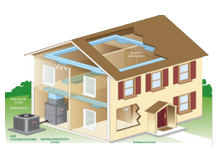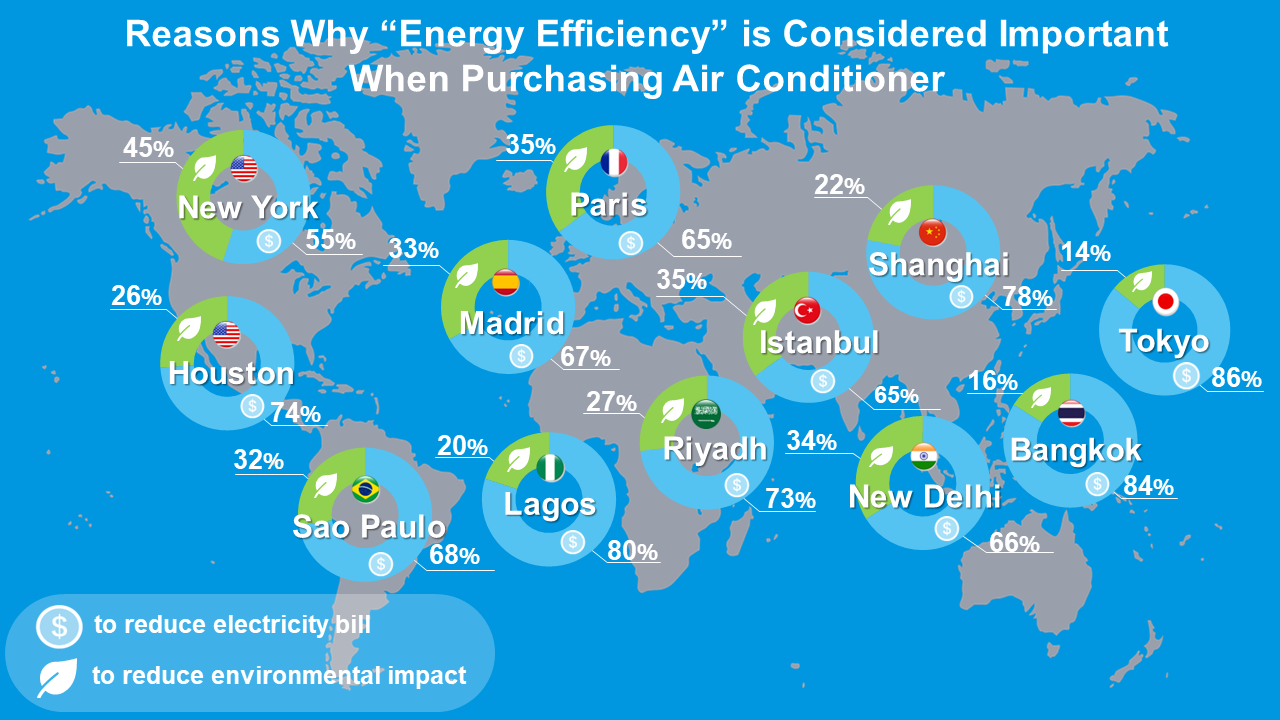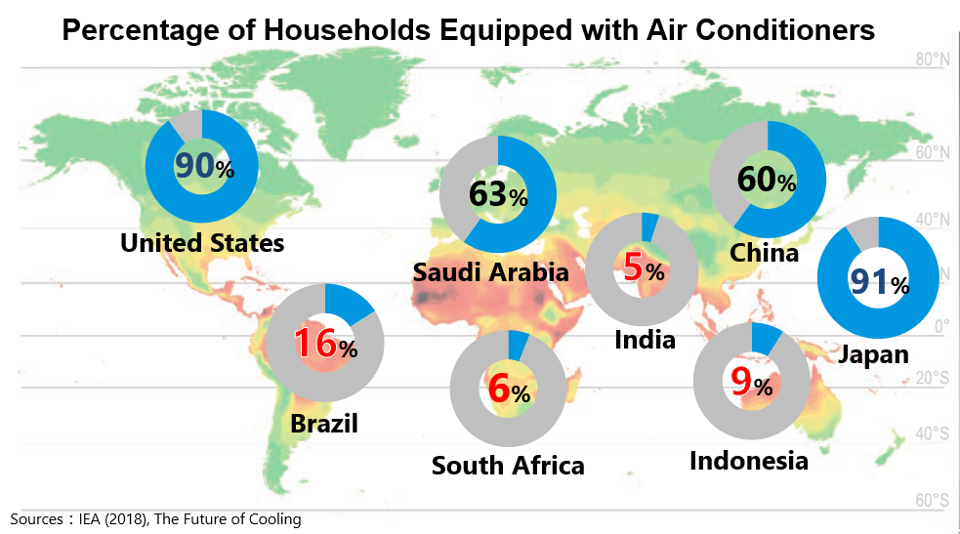Daikin World Air Survey
Daikin World Air Survey
“Awareness and Cultures Related to Air Conditioners and Air” among 1,200 people in 12 cities around the World
Daikin conducted the "Daikin World Air Survey" in 2024. This survey primarily highlights how people in 12 cities worldwide perceive and use air conditioners in their daily lives, exploring the differences and commonalities among cities.
Air conditioners, invented in the U.S. about 100 years ago, play a role as a kind of social infrastructure that is essential for a comfortable and healthy life. In July 2024, the global average temperature reached the highest value on record*1, making air conditioners even more important. Based on this background, Daikin aims to raise awareness of air conditioners and air among a global audience.
Daikin provides the ideal air for each region in 175 countries and regions. Striving to realize “Perfecting the Air” in the world, it continues to sincerely grapple with the diverse environments and needs of different countries and contribute to the sustainable spread of air conditioners.

How Many Months Do People Use Air Conditioners(Cooling) in a Year?
Among the 12 cities surveyed, Bangkok, Thailand topped the list with an average of 10.4 months of air conditioner use, followed closely by Lagos, Nigeria with 9.5 months. Furthermore, 70% of people in Bangkok and 53% of people in Lagos reported using air conditioners for “12 months (1 year).” Given their relatively high average highest air temperatures (hottest month)*2 among the surveyed cities (Bangkok: 96.8℉/36ºC, Lagos: 93.2℉/34ºC), and the average lowest air temperature (coldest month)*3 exceeding 68.0℉/20.0ºC, it seems that air conditioners are necessary throughout the year in Bangkok and Lagos.
Riyadh, Saudi Arabia and New Delhi, India are also considered hot cities, with average highest air temperatures (hottest month) exceeding 40ºC. The average number of months during which air conditioners are used in these two cities is 7.9 months and 7.0 months, respectively, which seems to be longer than other cities. In Riyadh and New Delhi, however, the average lowest air temperature (coldest month) is 9ºC and 8ºC, respectively, indicating that they also have cold seasons. Therefore, the percentages of people who use the air conditioner for “12 months” were 18% and 16%, respectively, which were considerably lower than Bangkok and Lagos.

*2
Temperature in the month with the highest average maximum temperature from January to December. (Average of 1992-2021 or 2012-2021).
Source: Time and Date https://www.timeanddate.com/weather/.
*3 Temperature in the month with the lowest average minimum temperature from January to December. (Average of 1992-2021 or 2012-2021).
Source: Time and Date https://www.timeanddate.com/weather/.
How Many Hours A Day Do People Use Air Conditioners in Summer?
Based on the survey, Daikin calculated the “average number of hours of air conditioner use when spending all day at home during the hottest month of the year*4.”
People in Houston were found to use air conditioners the longest with 17.2 hours, and a surprising 41% of Houston residents used them for 24 hours. The cities with the second and third longest hours of use were Riyadh, Saudi Arabia with 14.9 hours, and New York with 12.6 hours. It seems to have become commonplace for people in the U.S. where central air conditioning systems are widely adopted, to “leave their air conditioners on all the time” rather than turning them on and off frequently.

Characteristics of Residential Air Conditioners Worldwide

Air conditioners have been developed to suit different climates, lifestyles, and housing structures in various countries. Therefore, what comes to mind when people say "air conditioner" varies from country to country.
For example, the mainstream of the U.S. is a "central air conditioning system,” which sends cool or warm air to all rooms through ducts distributed throughout the house. On the other hand, many regions around the world commonly use “individual control air conditioning,” such as ductless mini-split air conditioners. These systems operate independently to deliver cool or warm air only to the rooms where it is needed.
*4
The average number of hours of air conditioner use was calculated based on the responses to the question “How many hours per day do you use an air conditioner (cooling) when spending all day at home in the hottest month of the year?” Responses of “1 to 2 hours” were calculated as 1.5 hours, “3 to 4 hours” as 3.5 hours, “5 to 6 hours” as 5.5 hours, “7 to 10 hours” as 8.5 hours, “11 to 15 hours” as 13 hours, “16 hours to less than 24 hours” as 19.5 hours, and “24 hours” as 24 hours.
Does the Set Temperature for Air Conditioners Vary from City to City?
Tokyo, Japan was found to be the city with the highest average set temperature for air conditioners*5 at home during the hottest month of the year at 79.2℉/26.2ºC, while Lagos, Nigeria had the lowest at 71.4℉/21.9ºC, with a difference of 7.8℉/4.3ºC.
The second and third lowest average set temperatures after Lagos were 72.0℉/22.2ºC in Sao Paulo, Brazil and 72.3℉/22.4ºC in New York. It is said that people’s perception of temperature depends on their country of origin and personal constitution, and in Lagos, Sao Paulo, and New York, many people seem to find lower temperatures more comfortable.
On the other hand, the average set temperatures in the Asian cities of Tokyo, Bangkok, Thailand, and Shanghai, China turned out to be higher than in other cities (Tokyo: 79.2℉/26.2ºC, Bangkok: 77.2℉/25.1ºC, Shanghai: 77.0℉/25.0ºC). Many people in Asian countries seem to be sensitive to cold or pay attention not to let the temperature get too low to save energy.

It was also revealed that 92% of people in Tokyo were concerned about their electricity bills when using air conditioners, the highest among the 12 cities. Furthermore, Tokyo had the highest percentage of people who “set the temperature higher (for cooling) or lower (for heating)” as a “measure to save electricity when using air conditioners at home” at 71%. The average set temperature in Tokyo may be related to the high level of consciousness about electricity bills.

*5
The average set temperatures were calculated based on the responses to the question “Which is the most frequently used temperature setting for air conditioners at home during the hottest month of the year?” Fahrenheit values are converted from the average in Celsius. Responses of “18°C or lower” were calculated as 18°C, while “30°C or higher” were calculated as 30°C. Responses stating “automatic” settings were excluded from the calculations.
Which City Has the Largest Difference Between
the 'Set Temperature' and 'Outside Air Temperature' in Summer?
The difference between the 'set temperature for air conditioners' and the 'outside air temperature' significantly influences air conditioner power consumption.
The difference between the average highest air temperature*1 and the average set temperature*5 of the hottest month was largest in Riyadh, Saudi Arabia at 37.1℉/20.6ºC (average highest air temperature 111.2℉/44.0ºC, average set temperature 74.1℉/23.4ºC), followed by New Delhi, India at 30.2℉/16.8ºC (average highest air temperature 104.0℉/40.0ºC, average set temperature 73.8℉/23.2ºC) and Lagos, Nigeria at 21.8℉/12.1ºC (average highest air temperature 93.2℉/34.0ºC, average set temperature 71.4℉/21.9ºC).
It was 10.4℉/5.8ºC (average highest air temperature 89.6℉/32.0ºC, average set temperature 79.2℉/26.2ºC) in Tokyo, and 4.1℉/2.3ºC (average highest air temperature 78.8℉/26ºC, average set temperature 74.7℉/23.7ºC) in Paris, France, which had the smallest difference. As the outside air temperatures are high in Riyadh and New Delhi, the load on the air conditioner seems to be relatively high.
Considering the “number of hours of air conditioner use per day” and the “difference between highest air temperature and set temperature” during the hottest period of the year, Riyadh stands out in both indices. It seems that air conditioners tend to run longer in environments where they are under significant strain in Riyadh.

Who is the Majority, Those Who Like Being Exposed to the Airflow of Air Conditioners or Those Who Dislike It?
Bangkok, Thailand had the highest percentage of people who like being directly exposed to and feeling the airflow of air conditioners (cooling) among the 12 cities at 98%. Also, Shanghai, China; Houston; New Delhi, India; Lagos, Nigeria; New York; Sao Paulo, Brazil; and Istanbul, Turkey had over 80%.
While people in most cities prefer to cool themselves under the airflow of air conditioners, the results of Tokyo, Japan and Madrid, Spain were divided between those who liked it and those who did not. While people can feel the coolness of being in the airflow on a hot day, preferences seem to be divided because the airflow can feel too cold or cause skin dryness if it is too strong.

What Factor is the Most Important When Purchasing An Air Conditioner?
In 11 out of 12 cities, “energy efficiency” was selected as the most important factor when purchasing air conditioners*6, especially marked in Bangkok, Thailand and Istanbul, Turkey. Only in Shanghai, China, the highest importance was given to “effective cooling/heating performance” and this was followed by “energy efficiency.”
In addition, New York, Houston, Paris, France; and Madrid, Spain had the percentage of people who chose “affordable price” nearly as high as that of “energy efficiency” (with a difference of less than 10%), indicating that people place importance on both the electricity costs and the initial cost of air conditioners. Meanwhile, people in Sao Paulo, Brazil; Bangkok; New Delhi, India; and Shanghai, China seem to place lower importance on the price of purchase than other cities.

*6
Respondents were asked to list the top three most important factors when purchasing an air conditioner, and the results were ranked by weighted average while giving weight values to the most important (3 points), the second most important (2 points), and the third most important (1 point).
As the reason why people placed the highest priority on “energy efficiency” when purchasing an air conditioner, “to reduce electricity bill” ranked higher than “to reduce environmental impact (e.g., global warming)” across all cities.
Even so, New York stood out with 45.2% of people who selected “to reduce environmental impact,” reflecting the reputation of New York as one of the most environmentally conscious cities in the U.S. In addition to Paris and Madrid in Europe, known as an environmentally advanced region, Istanbul, New Delhi, and Sao Paulo also had relatively high results among 12 cities, with more than 30% choosing “to reduce environmental impact.” However, many people in all cities seem to be more concerned about their electricity bills, which are closely related to their daily lives, at present.

Air Conditioners and Carbon Neutrality
While air conditioners play a vital role in protecting people’s lives, they are also said to be responsible for approximately 10% of the total electricity consumption in the world. If the electricity used by air conditioners comes from fossil fuels, a large amount of greenhouse gases is emitted when they are used. Because air conditioners are an essential part of people’s lives, it is necessary to promote carbon neutrality so that the environmental impact can be reduced even if the number of air conditioners continues to increase.
The total amount of CO2 emitted by one air conditioner throughout its lifetime is calculated to be 3,692 kg*7. In addition, 89% of the total emissions are generated “when air conditioners are used.” As a manufacturer, Daikin is committed to reducing emissions during the manufacture and transportation of air conditioners, and to improving energy-saving technologies to mitigate the impact on global warming, including when using air conditioners.
For more details: https://www.daikin.com/air/daikin_brand/carbon_neutrality
*7
Demonstrated by Daikin
How Is the Need for Air Conditioners Changing Compared to 10 Years Ago?
When asked whether people feel that their cities have become hotter or cooler compared to 10 years ago, the percentage of people answering “It has become much hotter” was highest in 10 out of 12 cities. Among these cities, Bangkok, Thailand had the highest percentage with 87%, followed by New Delhi, India with 81% and Sao Paulo, Brazil with 78%.
In addition, when asked whether people think that air conditioners have become more necessary than 10 years ago?” the percentage of people answering “I strongly think so” was highest in 11 out of 12 cities. In the order of higher percentage, these cities were, Sao Paulo at 81%, Bangkok at 79%, Riyadh, Saudi Arabia at 73%, New Delhi at 72%, Shanghai, China at 71%, and Lagos, Nigeria at 70%, and the necessity for air conditioners seems to be increasing more rapidly in these cities.
Roles Played by Air Conditioners and Their Penetration Rate
While air conditioners are widespread in many countries, they have also contributed greatly to the economic development of hot countries. Take Singapore, one of the most developed countries in Southeast Asia. Lee Kuan Yew, Singapore’s founding father and former prime minister once said, “the most influential invention of the last 100 years is the air conditioner. Singapore’s development would not be possible without air conditioning.” In an environment where it was too hot to concentrate on work, he was the first to install air conditioners in the buildings where civil servants worked, which made people more productive and created an efficient government.
As you can see, air conditioners have become an essential part of people’s lives. On the other hand, it is also true that in some countries and regions air conditioners are not yet widely used due to the circumstances surrounding the infrastructure and income levels, even when air temperatures are high. According to the IEA, the penetration rate is said to be 5% in India, 6% in South Africa and 16% in Brazil. However, the number of air conditioners in operation worldwide is expected to approximately triple by 2050 due to the development in emerging countries, and further popularization is expected in the future.

How Important Is Air Quality in Daily Life?
In a comparison of the percentage of people who consider air quality “very important” in their daily lives, Lagos, Nigeria topped the list at 95%. In the five cities - Sao Paulo, Brazil; Riyadh, Saudi Arabia; Bangkok, Thailand; Istanbul, Turkey; New Delhi, India and Houston - over 70% of people rated air quality as “very important.” Despite air being invisible, many residents in these cities may be mindful of air quality in their everyday lives. On the other hand, Tokyo, Japan and Paris, France had fewer people considering air quality “very important,” at 39% and 31% respectively.

What Types of Air-related Concerns Are There in the World?
When asked about “air-related concerns people have in their daily lives*6,” many people in most cities mentioned concerns about temperature and humidity, which are easy to feel. However, people also seem to suffer from “air pollution” such as viruses, odors and exhaust gas. In Lagos, the total percentage of concerns about air pollution was highest (61%) among the 12 cities, and especially “air pollution from exhaust gas, wildfires, etc.” ranked high. Nigeria is said to have the highest number of air pollution-related child pneumonia deaths in the world*7. Air is important not only for comfortable living but also for protecting people’s lives.

*6
Respondents were asked to list the top three “concerns related to air in their daily lives,” and the results were ranked by weighted average while giving weight values to the highest (3 points), the second highest (2 points), and the third highest (1 point).
*7
About Subject Cities for Survey
The way air conditioners are used varies greatly depending on the climate, housing style, etc. of the area, including the average air temperature and the highest and lowest air temperatures throughout the year. In this survey, we selected the cities to be surveyed by taking into consideration the climate and geographical balance.
Outline of the Survey
| Main body conducting the survey | Daikin Industries, Ltd. |
|---|---|
| Method of survey | Internet-based questionnaire |
| Survey subjects | 100 people in their 20s to 60s in each city who have air conditioners at home |
| Subject cities and survey period | Houston (DMA Houston), U.S. / May 24 to June 6, 2024 New York (DMA New York), U.S. / May 24 to June 6 Bangkok (Greater Bangkok), Thailand / May 24 to May 29 Istanbul (Istanbul Province), Turkey / May 30 to May 31 Lagos, Nigeria / May 24 to May 29 Madrid (Provinces of Madrid), Spain / May 24 to May 29 New Delhi (Delhi Capital Territory), India / May 24 to May 300 Paris (Ile-de-France), France / May 28 to May 29 Riyadh (Riyadh Province), Saudi Arabia / May 31 to June 5 Sao Paulo (State of Sao Paulo), Brazil / May 24 to May 29 Shanghai, China / May 24 to June 6 Tokyo, Japan / May 10 to May 21 |

